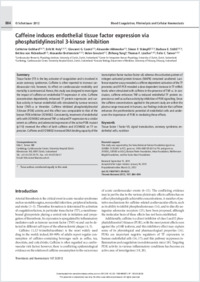Caffeine induces endothelial tissue factor expression via phosphatidylinositol 3-kinase inhibition
- Gebhard, C. Cardiovascular Research, Physiology Institute, University of Zurich, Switzerland - Center for Integrative Human Physiology, University of Zurich, Switzerland - Cardiology, Cardiovascular Center, University Hospital Zurich, Switzerland
- Holy, E. W. Cardiovascular Research, Physiology Institute, University of Zurich, Switzerland - Center for Integrative Human Physiology, University of Zurich, Switzerland - Cardiology, Cardiovascular Center, University Hospital Zurich, Switzerland
- Camici, Giovanni G. Cardiovascular Research, Physiology Institute, University of Zurich, Switzerland - Center for Integrative Human Physiology, University of Zurich, Switzerland
- Akhmedov, Alexander Cardiovascular Research, Physiology Institute, University of Zurich, Switzerland - Center for Integrative Human Physiology, University of Zurich, Switzerland
- Stämpfli, S. F. Cardiovascular Research, Physiology Institute, University of Zurich, Switzerland - Center for Integrative Human Physiology, University of Zurich, Switzerland - Cardiology, Cardiovascular Center, University Hospital Zurich, Switzerland
- Stähli, B. E. Cardiovascular Research, Physiology Institute, University of Zurich, Switzerland - Center for Integrative Human Physiology, University of Zurich, Switzerland - Cardiology, Cardiovascular Center, University Hospital Zurich, Switzerland
- Rickenbach, B. von Cardiovascular Research, Physiology Institute, University of Zurich, Switzerland - Center for Integrative Human Physiology, University of Zurich, Switzerland
- Breitenstein, A. Cardiovascular Research, Physiology Institute, University of Zurich, Switzerland - Center for Integrative Human Physiology, University of Zurich, Switzerland - Cardiology, Cardiovascular Center, University Hospital Zurich, Switzerland
- Greutert, Helen Cardiovascular Research, Physiology Institute, University of Zurich, Switzerland - Center for Integrative Human Physiology, University of Zurich, Switzerland
- Yang, Zhihong Vascular Biology, Department of Medicine, University of Fribourg, Switzerland
- Lüscher, Thomas F. Cardiovascular Research, Physiology Institute, University of Zurich, Switzerland - Center for Integrative Human Physiology, University of Zurich, Switzerland - Cardiology, Cardiovascular Center, University Hospital Zurich, Switzerland
- Tanner, Felix C. Cardiovascular Research, Physiology Institute, University of Zurich, Switzerland - Center for Integrative Human Physiology, University of Zurich, Switzerland - Cardiology, Cardiovascular Center, University Hospital Zurich, Switzerland
-
22.03.2012
Published in:
- Thrombosis and Haemostasis. - 2012, vol. 107, no. 5, p. 803-1007
English
Tissue factor (TF) is the key activator of coagulation and is involved in acute coronary syndromes. Caffeine is often reported to increase cardiovascular risk; however, its effect on cardiovascular morbidity and mortality is controversial. Hence, this study was designed to investigate the impact of caffeine on endothelial TF expression in vitro . Caffeine concentration-dependently enhanced TF protein expression and surface activity in human endothelial cells stimulated by tumour necrosis factor (TNF)-α or thrombin. Caffeine inhibited phosphatidylinositol 3-kinase (PI3K) activity and this effect was comparable to that of the known PI3K inhibitor LY294002. Consistently, treatment of endothelial cells with LY294002 enhanced TNF-α induced TF expression to a similar extent as caffeine, and adenoviral expression of the active PI3K mutant (p110) reversed the effect of both caffeine and LY294002 on TF expression. Caffeine and LY294002 increased DNA binding capacity of the transcription factor nuclear factor κB, whereas the activation pattern of mitogen-activated protein kinases (MAPK) remained unaltered. Luciferase reporter assay revealed a caffeine dependent activation of the TF promoter, and RT-PCR revealed a dose dependent increase in TF mRNA levels when stimulated with caffeine in the presence of TNF-α. In conclusion, caffeine enhances TNF-α-induced endothelial TF protein expression as well as surface activity by inhibition of PI3K signalling. Since the caffeine concentrations applied in the present study are within the plasma range measured in humans, our findings indicate that caffeine enhances the prothrombotic potential of endothelial cells and underscore the importance of PI3K in mediating these effects.
- Faculty
- Faculté des sciences et de médecine
- Department
- Département de Médecine
- Language
-
- English
- Classification
- Biological sciences
- License
-
License undefined
- Identifiers
-
- RERO DOC 31064
- DOI 10.1160/TH11-09-0624
- Persistent URL
- https://folia.unifr.ch/unifr/documents/302681
Statistics
Document views: 136
File downloads:
- pdf: 203
